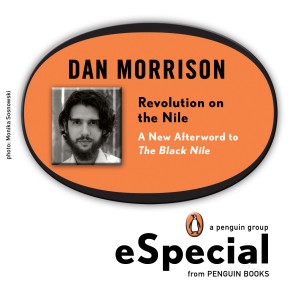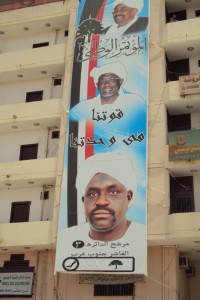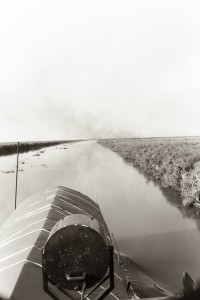Travel, literature, and a little too much gunfire: Andrew Burmon talks with Dan Morrison about The Black Nile.
Leaving South Sudan with a Broken Gear Stick
 * Cruising on jellied asphalt through the northern badlands of South Sudan when the unthinkable happens. An excerpt from The Black Nile on NationalGeographic.com
* Cruising on jellied asphalt through the northern badlands of South Sudan when the unthinkable happens. An excerpt from The Black Nile on NationalGeographic.com
* In Cairo, riots, repression, and a room full of dancing men. A diverting excerpt from The Black Nile, courtesy our friends at Swink Magazine in Los Angeles.
Southern Kordofan: No backing down
The northern wing of the Sudan People’s Liberation Movement has issued a strong statement committing itself to the Garangist vision of a reformed Sudan, with “No Compromise, No Retreat” in Southern Kordofan. Today’s statement comes after a two-day meeting attended by Blue Nile state governor Malik Agar, Southern Kordofan commander Abdelazis El Hilu, and SPLM Secretary General Yasir Arman.
The SPLM says that any peace negotiations must take place outside Sudan, under the auspices of a third-party mediator. President Omar al Bashir’s position is the opposite: Negotiations will take place only in Sudan, he says. The SPLMN’s full statement is below.
Sudan: The UN’s report on Southern Kordofan
I’ve received a copy of the United Nations Mission in Sudan’s June human rights report on fighting in Southern Kordofan. It’s received coverage recently by the New York Times, the Guardian, and the Associated Press, among others. Still, it’s worth reading all 19 pages.
The document, which I am posting below, is detailed and grim. It confirms earlier reports of the existence of mass graves, a racial murder spree by Khartoum’s army, and the targeting of civilians by the Sudanese Armed Forces and its related militias and police.
Continue reading “Sudan: The UN’s report on Southern Kordofan”
Revolution on the Nile
 In just eight days a new country, the Republic of South Sudan, will be born. It’s a huge step – but not the last step – in a 55-years-and-counting struggle for dignity and self-determination.
In just eight days a new country, the Republic of South Sudan, will be born. It’s a huge step – but not the last step – in a 55-years-and-counting struggle for dignity and self-determination.
The south’s departure from Sudan has been as troubled as its union, with the recent fighting in Southern Kordofan and Abyei, as well as continuing insurgencies by southern renegades including George Athor and Peter Gadet. The Lord’s Resistance Army, too, remains active in the western part of the new country.
These are only the most obvious and immediate challenges faced by the southern people. Southern Sudan’s leaders, its people, and its nascent institutions will have to struggle mightily to prevent their new state from resembling the old Sudan in its approach to human rights, inclusivity, opportunity, and rule of law.
None of this should take away from the gigantic achievement that southern Independence represents. Millions died and millions more were made homeless, and endured famine, captivity and fear to get to July 9: A delicious and hugely challenging Year One. Democracy entails the right of the people and their representatives to make mistakes, to take responsibility for those errors (to “own” them, in the current parlance) and make corrections. It won’t be at all easy. But it’s a great, historic moment.
On July 5, Penguin Books will publish Revolution on the Nile, my new Afterword to The Black Nile, as an “e-special” available on the Kindle, the Nook, and Apple’s iPad, iPhone, and iTouch, as well as other e-readers. Revolution on the Nile updates The Black Nile with an account of south Sudan’s January freedom referendum, squashed attempts at public protest in northern Sudan, and the electrifying revolt against Hosni Mubarak in Egypt.
Meet the Bernie Madoff of Sudan
 There’s an old saying in Darfur that goes: Kalash au bilash; Kalash begim al kash.
There’s an old saying in Darfur that goes: Kalash au bilash; Kalash begim al kash.
Translation: “You’re trash without a Kalashnikov; get some cash with a Kalashnikov.”
My newest story at Slate.com is about a Darfur police corporal who stole millions without ever flashing a gun.
I hope you enjoy the story of Adam Ismael, his $180 million Ponzi scheme, and Omar al-Bashir’s economic war on Darfur. It’s the first installment in a four-day series on the coming breakup of Sudan. (And here’s a piece I wrote from Sudan in January during the south’s historic independence vote.)
Stories That Ring True: The Black Nile
 Part travelogue, part crazy adventure tale, part political reportage: Veteran foreign correspondent Morrison and a buddy build a boat and paddle up the Nile River through Uganda, Sudan and Egypt. Morrison’s African river journey is a paradoxical mixture of awe-inspiring discoveries, eye-opening human interactions and perilous escapes. — Chuck Leddy, the Minneapolis Star-Tribune
Part travelogue, part crazy adventure tale, part political reportage: Veteran foreign correspondent Morrison and a buddy build a boat and paddle up the Nile River through Uganda, Sudan and Egypt. Morrison’s African river journey is a paradoxical mixture of awe-inspiring discoveries, eye-opening human interactions and perilous escapes. — Chuck Leddy, the Minneapolis Star-Tribune
Sudan: Where Children Vote
My newest piece, a bit truncated, on the opinion pages of today’s New York Daily News. Apparently I’m keeping Charles Krauthammer’s seat warm.
Sudan: How to Throw an Election
My new article, published yesterday in Slate, looks at the twisted politics behind Sudan’s recent election. Check it out.
Sudan: A Rare Fix That Wasn’t
 In a rare spot of good news to come out of Sudan’s elections, it appears the former rebels of the Sudan People’s Liberation Movement have won the governorship of Blue Nile state. That is to say, the southern rebels, competing in a rigged election, were victorious in a northern state .
In a rare spot of good news to come out of Sudan’s elections, it appears the former rebels of the Sudan People’s Liberation Movement have won the governorship of Blue Nile state. That is to say, the southern rebels, competing in a rigged election, were victorious in a northern state .
It’s the SPLM that’s made the announcement, [Update: It’s now official.] declaring that the National Election Commission has called the race for their candidate, Malik Agar. If this holds up – if the NEC, which has proved itself to be an extension of the ruling National Congress Party, publicly declares Malik Agar the winner – it will stand as the greatest reversal of what has proven to be a multi-multi-million-dollar sham election. Continue reading “Sudan: A Rare Fix That Wasn’t”
